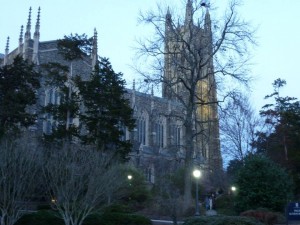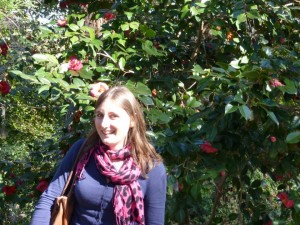Reflections around the Eight Annual Feminist Theory Workshop
Duke University, 21-22 March 2014
The Feminist Theory Workshops organized by Duke Women’s Studies are a worldly-renowned platform for cutting-edge and multidisciplinary conversations around questions of gender, sexuality and queerness, identity and (post)humanism. The Centre for Gender, Sexuality and Writing at the University of Kent has a long tradition of supporting postgraduate attendees, and I was the happy recipient of their travel bursary (topped-up by the Faculty) this year. I was not the only student from Kent at Duke: in the workshop’s interdisciplinary spirit, the Kent delegation was formed by myself and Nayeli Urquiza Haas, from Kent Law School.
After the flight to the States, spent mostly reading the papers provided by the four keynote speakers, on my first morning in North Carolina I explored the Duke campus, an impressively large green area with neo-Gothic architecture, botanical gardens and a Chapel at its centre which is almost the size of Canterbury Cathedral. The workshop itself started in the early afternoon, with opening words by Professor Ranjana Khanna, Margaret Taylor Smith Director of Women’s Studies at Duke. Khanna underlined how the Feminist Theory Workshops at Duke have become truly cross-cultural spaces of exchange, where international participation has constantly increased over the years. She also gave a moving obituary of the late José Antonio Muñoz, keynote at last year’s workshop, before introducing the first speaker, Penelope Deutscher (Professor of Philosophy, Northwestern University), who, starting from politics of mourning and images of motherhood as metaphors placed on the edge between life and death, delivered her talk entitled ‘That Death Which is Not One: Woman as Exception in Derrida’s The Death Penalty’.
The aim of Deutscher’s contribution was to draw a connection between Foucault’s ideas on sovereign power, bodiesand death penalty, and Derrida’s 1999-2001 seminars published in the two-volume book titled The Death Penalty (2013). Although the two thinkers always dismissed mutual similarities in this respect, Deutscher productively linked them through the powerful image of the telephone/umbilical cord which separates a convict condemned to death to the authority deciding on his/her fate; this analogical ‘maternity of thought’, for Deutscher, stands for paradigms of life and death, in both Foucault and Derrida. The dimension of sexual difference was introduced through an examination of Victor Hugo’s political texts advocating for the abolition of death penalty in democratic France: Hugo, who identifies women with the womb of civilization (and thus, of France, democracy, the homeland and the Empire), sees the condemned pregnant woman as the utmost barbarity and the greatest aberration of mankind. If Foucault’s 73-78 lectures at the Collège de France hold a very similar position in emphasizing the woman’s special condition, Derrida differs in that he introduces the concept of fraternity, the very fraternité on which France’s entire post-revolutionary history is based. While, on the one hand, fraternité is exclusive in that it creates a division between men, as the rightful citizens and holders of power, and women, apparently left in a subaltern position, Deutscher explained how fraternity in Derrida may be seen as transcending towards an a-gendered society.
Not all too dissimilar from family relations, ‘intra-actions’ between matter and time were central in the second lecture, delivered by Karen Barad (Professor of Feminist Studies, Philosophy, and History of Consciousness at UCSC): one of the most authoritative voices in posthumanism, Barad brought us on a journey through quantum physics and meta-physics titled ‘Queering Time: Material Entanglements, Temporal Diffractions and Rememberings’. Barad set off to deconstruct physics and the human-centred perceptions of time by reclaiming the centrality of matter over and beyond the traditional distinction between nature and culture: matter is not merely ‘a canvas or the inscription of culture’, rather, it is the basis of the world’s ‘being, becoming, knowing and being well together.’ In the wake of Niels Bohr’s work and developing Max Planck’s quantum model, Barad sees the quantum as the smallest discrete unit: the quantum is queer in that it transcends the dichotomy between waves and particles, and leaps dis/continuously across different levels. The intrinsic discontinuity and undoing of matter was best shown by her guiding us through Thomas Young’s experiment of the two-slit apparatus, where waves and particles change their behaviour in performance and ultimately prove to be of the same identity in nature. The concepts of space and time, therefore, are matter’s agential performances instead of (arbitrary) universals: nonetheless, despite the nature of time and space as phenomena, Barad interprets the traces left by the past as major inheritances projected towards responsibility and justice for the future. When asked, during the Q&A, how to interpret this projection towards the future with respect to queer negativity, Barad called for a queer affirmativity, in the need to seek an answer to the question: ‘what is it that we have to say yes to?’
After receiving such dense food for thought, the Saturday session started with Alondra Nelson’s (Professor of Sociology, Columbia University) keynote on ‘DNA Diasporas: A Dream Deferred’, which examined the search for roots and cultural identity in genetic research. With the specific example of the African-American community, Nelson’s paper questioned the validity of genome-tracing projects and enterprises, and whether retracing one’s ancestry operates as a true form of reconciliation. Nelson explained various reasons for which DNA-based identity projects are troublesome: the testing methods are often not transparent and the ancestry they promise to uncover is reductively heteronormative and hypermasculine; questions of hybridity and inter-racial genealogy are completely left unaddressed, while the extensive media coverage that this form of search of one’s roots receives relies heavily on its sentimentality and marketability. Although such types of genetic revelation are non-egalitarian, elitist and problematic in their demand for revenge for centuries of black oppression, they claim to carry the legacy of the 20th century’s civil rights movements, as demonstrated by several court cases where descendants of slaves demanded repayment and restitution for their ancestors’ exploitation. Ultimately, these attempts at recovering one’s past tend to see the totality of Africa as an indistinct resource, in a new form of colonialism which endorses and promotes race as a distinctive trait instead of promoting, in the wake of the civil rights movement, a more productive culture of commemoration and forgiveness.
The final speaker, Karen Engle (Minerva House Drysdale Regents Chair in Law, University of Texas, Austin), brought questions of representation, identity and legislation even further, in her lecture ‘The Grip of Sexual Violence’, on the problematic treatment of rape as genocide in recent UN resolutions and much of Western public opinion. By giving us an overview of the language with which the United Nations read sexual violence as primarily against women, instead of directed towards women, children and men, she exposed how current international debates identify women exclusively as victims in need of protection. She also demonstrated how, in the era of the 2.0 Internet and social media, discourses around sexual violence in war contexts often operates within elitist and racist structures. The Stop Rape Now! campaign, promoted by the UN to contrast sexual violence in conflicts, is significant in this respect: everyone, that is every English-speaking individual with Internet access, can engage in the fight against rape in conflict zones such as South Sudan just by posting on the website one’s picture in the crossed-arm position shown by campaign celebrity-supporters Charlize Theron and Nicole Kidman. Engle rightly underlined how these digital forms of charity and public engagement are not only exclusive and patronizing, but also racist: the images of white actresses representing and defending African are ultimately but an evolution of what Gayatri Spivak, in ‘Can the Subalter Speak?’ (1988) importantly denounced as Indian women’s impossibility to speak for themselves before the English rule against the so-called ‘sati’ practice. If in the system exposed by Spivak ‘white men are saving brown women from brown men,’ then in the Stop Rape Now! Campaign gender has shifted: now ‘white women are saving black women from black men’.
At the end of the talks, group seminars encouraged attendees and speakers to continue the fruitful discussions started in the lectures: led by Penelope Deutscher, my group discussed identity and search for one’s roots, stimulated by Nelson’s contribution, before moving on to unravel the meaning of justice touched by Barad during her talk.
The final remarks, delivered by Stephanie Clare (Duke University), Ellen Mortensen (University of Bergen) and Gillian Harkin (University of Washington) brought the conversation back to the whole audience for yet more interesting questions on archives and feminist meta-language. Professor Khanna closed the workshop by welcoming all participants to return next year.
As for me, the two-day event ended with a highlight: the final dinner for graduate students in the historical building of Duke Women’s Studies was the perfect opportunity to network, discuss the workshop in its entirety and start processing the many ideas and thoughts it stimulated.
To conclude, I think that the winning formula of the Feminist Theory Workshops is given by its size and format: participants in the number of, approximately, 100 from across fields of study, countries and institutions could establish fruitful ‘intra-actions,’ as Barad would have it, between disciplines and contexts, all the while enjoying a friendly and quite casual atmosphere. Attending the eighth Feminist Theory Workshop made me discover new authors, discuss urgent theoretical questions with fellow students and researchers from across the globe, and gave me new insights, from different perspectives, into key concepts of both my work and my teaching. I’d highly recommend it to fellow feminists and theorists, and I am really grateful I had the opportunity to be part of such a wonderful event!
For further information, see the excellent Twitter Storify by the Department of Women’s, Gender and Sexuality Studies at Emory University, Atlanta (GA): https://storify.com/emory_ws/feminist-theory-workshop-2014?utm_source=t.co&utm_content=storify-pingback&utm_medium=sfy.co-twitter&awesm=sfy.co_pRmV&utm_campaign=
Barbara Franchi is a second-year Ph.D. Candidate and Assistant Lecturer at the University of Kent. Her research focuses on intertextuality in A. S. Byatt’s novels and short stories. She is interested in contemporary English fiction, the Bildungsroman, gender studies and feminist theory, and oral forms of literature. She teaches Romanticism and Critical Theory, and she is guest-editing a special issue titled ‘Feminist Movements Across the Board’ for Contention: the Multidisciplinary Journal of Social Protest.
@barbara_franchi
https://kent.academia.edu/BarbaraFranchi

